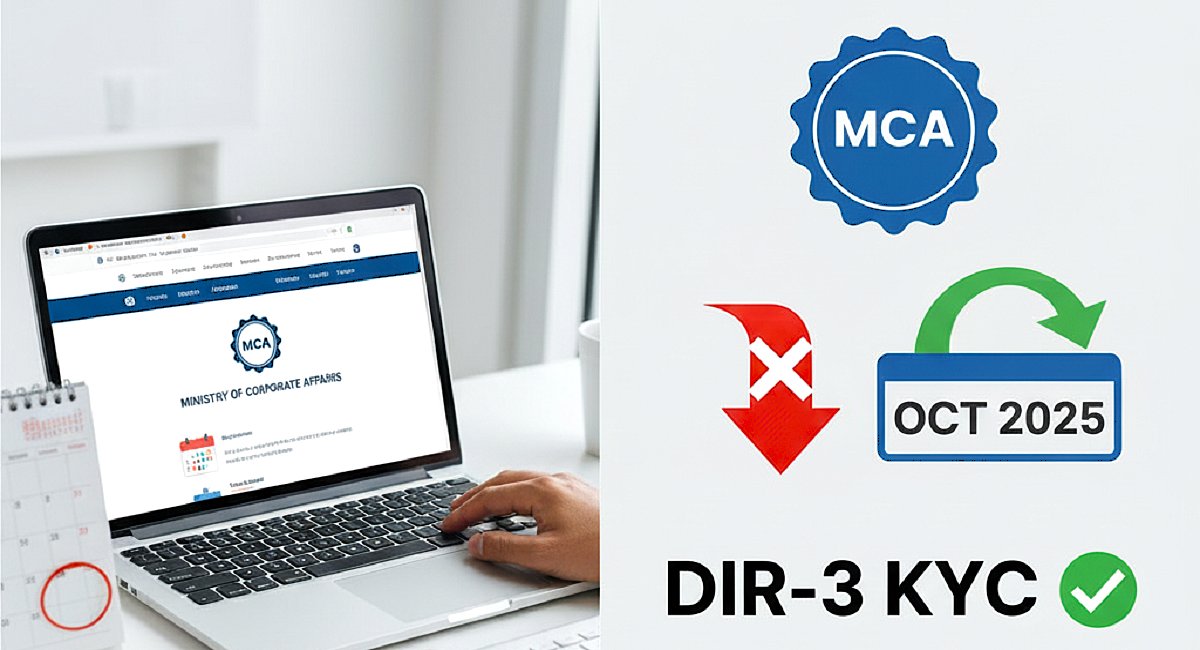Deadline Extended, No Late Fee Till October 15
The Ministry of Corporate Affairs (MCA) has officially extended the DIR-3 KYC due date for financial year 2024-25. Directors can now file e-form DIR-3 KYC or the web-based DIR-3 KYC-WEB until October 15, 2025, without incurring any late fee, per General Circular No. 04/2025, released on September 29, 2025.
Earlier, the due date was September 30, 2025, which aligns with the traditional annual deadline under Rules for director KYC compliance.
This extension gives directors — especially those who have yet to file — a grace period to complete their KYC without penalty.
Background: What is DIR-3 KYC & Who Must File?
Purpose of DIR-3 KYC
DIR-3 KYC is an annual compliance requirement under the Companies (Appointment and Qualification of Directors) Rules, 2014. Its aim is to keep the Ministry’s director database up to date by verifying directors’ email, mobile, address, PAN, and other personal details.
If a director fails to file by the deadline, their DIN (Director Identification Number) is marked “Deactivated due to non-filing of DIR-3 KYC.”
Who Must File
- All directors with an approved DIN as of March 31, 2025, must file DIR-3 KYC for FY 2024-25.
- This also includes disqualified directors unless their DIN has been surrendered or deactivated by official process.
- Directors who have never filed DIR-3 KYC before or whose details (such as mobile, email) have changed must use e-form DIR-3 KYC.
- Directors who have previously filed and no personal detail has changed can use the simpler DIR-3 KYC-WEB (web-based) option.
What the Extension Means for Directors
Penalty Avoided, But Time Is Limited
Because of the extension, directors who file by October 15, 2025, will not face the usual penalty of ₹5,000 for late filing.
After October 15, if a director still fails to file, their DIN will remain deactivated and would need to be reactivated by paying the statutory fee.
Surge in Compliance Expected
In recent years, DIR-3 KYC compliance has seen strong growth. Between April and September 2024, over 22.98 lakh DIR-3 KYC forms were filed.
However, many filings tend to be delayed toward the deadline. The extension is expected to ease pressure on the MCA portal and compliance firms.
Watch for Updates & Portal Performance
Given the extension and the flood of filings, directors should expect heavy traffic on the MCA portal. They should avoid last-minute submission and ensure documents, DSCs, and OTP-enabled contacts are ready in advance.
How to File DIR-3 KYC / Login on MCA
Step-by-Step Filing Process
- Visit MCA Portal / Login – Directors must log in via the MCA v3 portal using their DIN, password, and token.
- Select DIR-3 KYC / KYC-Web – If no change needed, choose the Web form; otherwise, use the full DIR-3 KYC e-form.
- Enter or Update Details – Name, address, mobile, email, PAN, and proof of residence or address.
- OTP Verification – OTPs will be sent to registered mobile and email for confirmation.
- Digital Signature & Certification – The form must be signed by the director and certified digitally by a practicing CA, CS or CMA (for e-form).
- Submit & Record SRN – Once uploaded, an SRN (Service Request Number) is generated for tracking status.
Tips & Reminders
- Ensure email and mobile number are current and able to receive OTPs.
- Use your Digital Signature Certificate (DSC) registered on MCA portal.
- For Web form users with no changes, the process is quicker and requires fewer inputs.
- Avoid submitting close to the extended deadline to bypass portal congestion.
FAQs
The deadline for filing DIR-3 KYC and DIR-3 KYC-WEB without late fee is now October 15, 2025, extended from the earlier September 30.
If not filed by the extended date, the director’s DIN will be deactivated. To reactivate, the director must file the KYC form with a ₹5,000 fee
All individuals holding an approved DIN as of March 31, 2025 — even disqualified directors — must file DIR-3 KYC for FY 2024-25.
With the mca dir 3 kyc due date extension to October 15, directors should take advantage of the additional time to ensure compliance. Filing early ensures smoother processing, avoids technical glitches, and secures your active DIN status without penalty.









